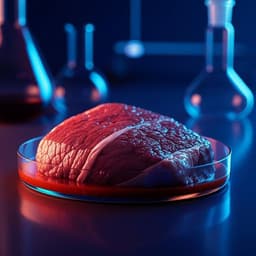
Food Science and Technology
Decellularised plant scaffolds facilitate porcine skeletal muscle tissue engineering for cultivated meat biomanufacturing
P. Murugan, W. S. Yap, et al.
This groundbreaking study by Priyatharshini Murugan and colleagues delves into the innovative use of decellularized asparagus scaffolds for cultivating meat. The scaffold supports the growth of myoblasts and stem cells, creating a meat prototype that resembles pork loin, showcasing the promise of sustainable biomanufacturing.
Related Publications
Explore these studies to deepen your understanding of the subject.







